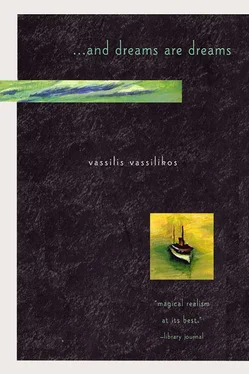Vassilis Vassilikos - ...And Dreams Are Dreams
Здесь есть возможность читать онлайн «Vassilis Vassilikos - ...And Dreams Are Dreams» весь текст электронной книги совершенно бесплатно (целиком полную версию без сокращений). В некоторых случаях можно слушать аудио, скачать через торрент в формате fb2 и присутствует краткое содержание. Год выпуска: 1995, Издательство: Seven Stories Press, Жанр: Современная проза, на английском языке. Описание произведения, (предисловие) а так же отзывы посетителей доступны на портале библиотеки ЛибКат.
- Название:...And Dreams Are Dreams
- Автор:
- Издательство:Seven Stories Press
- Жанр:
- Год:1995
- ISBN:нет данных
- Рейтинг книги:3 / 5. Голосов: 1
-
Избранное:Добавить в избранное
- Отзывы:
-
Ваша оценка:
- 60
- 1
- 2
- 3
- 4
- 5
...And Dreams Are Dreams: краткое содержание, описание и аннотация
Предлагаем к чтению аннотацию, описание, краткое содержание или предисловие (зависит от того, что написал сам автор книги «...And Dreams Are Dreams»). Если вы не нашли необходимую информацию о книге — напишите в комментариях, мы постараемся отыскать её.
...And Dreams Are Dreams — читать онлайн бесплатно полную книгу (весь текст) целиком
Ниже представлен текст книги, разбитый по страницам. Система сохранения места последней прочитанной страницы, позволяет с удобством читать онлайн бесплатно книгу «...And Dreams Are Dreams», без необходимости каждый раз заново искать на чём Вы остановились. Поставьте закладку, и сможете в любой момент перейти на страницу, на которой закончили чтение.
Интервал:
Закладка:
In her mind, full of fruit trees that never bore fruit because their flowers had been struck by an angry frost, while she is lying on the pavement, having hit her head, feeling dazed, and while she can hear above the roof of her skull, shaken by the unexpected collision of the two cars, which would surely have injured her more seriously if, as though by magic, the left car door had not been flung open by the force of the crash, throwing her outside, so at the very moment when she notes the deep alienation among people who live in a city that differs little from the jungle — except that there, the beasts surely would show more compassion for a fallen one of their species — at that very moment, in a half faint, but with all her faculties intact, Doña Rosita can hear the anxious voices of the drivers who hit her. They are talking overexcitedly about insurance, no one offering her a helping hand to get up; on the contrary, she can hear through the fog of her mind phrases like: “What’s the point of calling an ambulance? Can’t you see she’s all right? She isn’t even bleeding.” Phrases that denote the fear of the two drivers who had both crashed their cars into the right-hand door of her Mini Morris, throwing her out through the left-hand door. These two unknown drivers, talking among themselves, are joined by their common infraction: the second had accelerated because he saw the first doing so. And as she lies there on the pavement, the speakers in Doña Rosita’s head also bring to her the phrases of people who are taking her side, contrary to the police officer who insists that it’s no big deal, and the sooner we wrap this up the better. Doña Rosita, wanting to grab onto something, onto a pleasant memory in order to survive not her death so much as her deeper desolation, her abandonment on the pavement by her fellow human beings who seem concerned only with the damage to their cars, with their insurance, with everything except the damage to the human being (that was the horror of this sudden realization in the middle of the night, under a light rainfall). And while she lies immobilized on the pavement, Doña Rosita projects into her cloudy mind, in the form of a consubstantial trinity, in order to save herself from her present misery, three beautiful moments she spent with Don Pacifico during their recent travels over the Christmas holidays in the vicinity of three monastery chapels: three Holy Virgins, three mystically interconnected experiences.
Inside her shaken mind, they spring up more vivid than ever before, like three secret flowers, and reveal to her their deeper meaning, their secret charm.
She was in Salonika, the city that had known such sorrow, where her friend Don Pacifico had his roots, and where he was showing her around, trying to find within his own mythology the nonexistent traces of his origin. Very little survived of the city’s Jewish heritage. Everything had been devoured by a barbaric construction boom that had wiped out the few remaining old houses.
Finally, after stopping at a bookshop to visit Mr.
Molkhos, a distant uncle of Don Pacifico’s, they took a taxi up to the old ramparts, and from there ended up at the Monastery of the Vlattades, where they found the church door closed. They watched the peacocks, waiting for one of them to open the fan of his tail. No luck.
The day was foggy, the kind of weather that, like a wedding veil, suits this city we call the Bride of the Thermaic Gulf, the once-glorious cocapital of the Byzantine Empire. They had been sightseeing all morning and hadn’t found a single place open. Apart from his own disappointment at not finding a trace of his heritage (except for the bookseller who had remained, as if by a miracle, unchanged over the years), everything else he wanted to show her happened to be closed that day: the restored White Tower; the Archaeological Museum with the treasures from Vergina; the churches — Saint Sophia and all the others — except for Saint Dimitris, the mosaics of which Doña Rosita had seen when she had passed through Salonika on another occasion.
And now, after coming all the way up to the ramparts, they found the Monastery of the Vlattades closed as well, and the peacocks refusing to display their tails. But as they prepared to leave — the taxi waited for them at the entrance of the monastery with its meter running — Doña Rosita noticed, in the small darkened church, the figure of an old lady, which at first she took to be a shadow, something incorporeal.
They knocked, and the little old lady opened the door.
She was wizened and bent over, but she began straight away telling them the history of the monastery, and how it was named after “vlatti,” a fabric of wool and silk that the monks used to make and sell all over the known world. The church was tiny and could barely fit all three of them.
The memory of Saint Peter’s of Rome, with its marble luxury and metaphysical barbarity, was still fresh in Doña Rosita’s mind. Thus she was relieved to find herself inside the shell of this church, which, were she to slightly raise her wide shoulders, would envelop her like a snail and keep her under its protection. The walls were blackened, and the fragmented mosaics looked like shards of pottery that experts had stuck back together, leaving the missing parts painted in ocher. There were ancient and more recent icons; telling them when the monastery was built, the old woman led them to a smaller enclave, where the foot of the apostle stopped and formed, along with the other stones, the sign of the cross. It was forbidden to step there. The old woman was from Constantinople, and she assured them that with the courage of faith, one can fall into the fire and not be burned. They left her a small tip and went out into the courtyard.
Doña Rosita had been completely immersed in the experience; she remembered now, as she lay sprawled on the pavement, the drunkenness that had come over her as she had looked into the intense eyes of the old woman. She remembered the fulfillment she had known, her soul finally quenching its thirst, as she listened to the old lady talk of the lost grandeur of Constantinople; the Patriarchs; and the last king of Byzantium, who had turned into marble, with all the reverence inspired in her by that little church, lit by the flickering flames of two candles, its lamps burning constantly with the oil of faith. The metaphysical prolongation of this place, none of whose joys she had tasted, since everything that day was closed, made up for all the ugliness she had seen.
Everything that was being built around the little church was ugly. The blocks of flats that had overrun the Upper City were ugly. The cars that buzzed unnecessarily around the old castle were ugly. But the little old woman had saved the day. She had communicated the shiver of faith. The history of the monastery became linked to her own distant past, which had also been lost, mummified somewhere in the lost homelands of Asia Minor. Just as Don Pacifico, once he had seen Mr. Molkhos, found the strength to continue to live in this city, which, during the eighteenth century had been the birthplace and home of the last prophet of his race, so did Doña Rosita, by virtue of the thread handed to her by the old woman, find herself reconnected, in the shell of the church, with her own past — that of a Byzantine empress — and fortified by the power of faith, that unknown power that will keep us from burning should we fall into the fire. The eyes of the little old woman burned brightly as she spoke, and Jesus Christ, Son of God, our Savior, was the ichthus, the fish she would have for lunch. After all, He had been the first to give her that right: “Take, eat; this is my body….”
The second scene, following on the heels of the first, took place in Nafplion. As soon as they arrived, before they even checked in to the hotel, in the dusky light just before nightfall, Don Pacifico took her for a walk along the path that starts after the port, twisting around the mountain above the sea, where, in the distance, they could see a ship slowly approaching, cutting silently through the water’s satin surface, measuring time at its own pace, that of the daylight draining from the sky. They took a vegetation-choked offshoot of the path, and found themselves at a chapel that was above the main path and offered a better view of the open sea and the waters of the gulf. There was no one in the chapel; its icons were unguarded. They each lit a candle, Don Pacifico more in order to accompany her. There, too, appeared a woman, a sacristan, to collect the candles and lock the door for the night. They didn’t speak. The icons that had been stolen by lowlife tourists and antique smugglers had been replaced by cheap paper replicas.
Читать дальшеИнтервал:
Закладка:
Похожие книги на «...And Dreams Are Dreams»
Представляем Вашему вниманию похожие книги на «...And Dreams Are Dreams» списком для выбора. Мы отобрали схожую по названию и смыслу литературу в надежде предоставить читателям больше вариантов отыскать новые, интересные, ещё непрочитанные произведения.
Обсуждение, отзывы о книге «...And Dreams Are Dreams» и просто собственные мнения читателей. Оставьте ваши комментарии, напишите, что Вы думаете о произведении, его смысле или главных героях. Укажите что конкретно понравилось, а что нет, и почему Вы так считаете.












